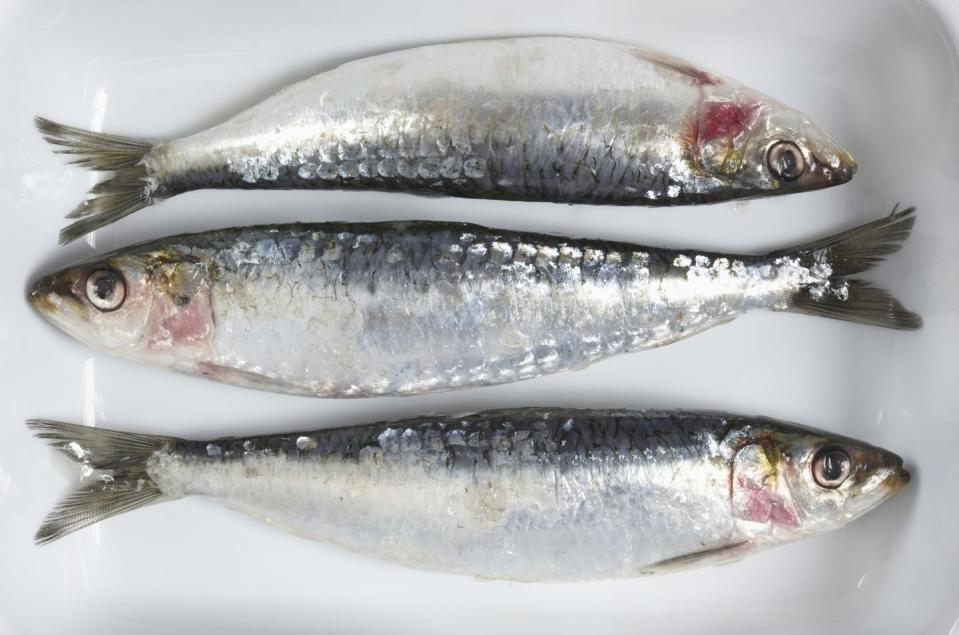Omega 3: is fish oil the secret to good health?

Every week a new grain or undiscovered fruit is hailed as the new superfood. But one nutritional icon has maintained its spot in the superfood hall of fame: fish oil.
Rich in omega-3, fish oil is credited with everything from super smooth skin to brain power. But is fish oil all it's cracked up to be, and if so, how can we make sure we're getting enough?
What's the big deal about fish oil?
Fish oil – a type of omega-3 fatty acid – is an essential fat, so-called because our bodies need it but, unlike other types of fat, we can't make it from other fats or resources. Instead, we rely on getting omega-3 from our diet.
There are two active forms of omega-3: EPA and DHA, which are found mainly in oily fish such as salmon, mackerel, sardines and anchovies, and which come with multiple health benefits.
'Fish oils are beneficial for heart, eye and brain health as well as having anti-inflammatory properties, so they may help reduce symptoms of inflammatory diseases such as arthritis, says nutritionist Kim Pearson. 'They are also essential for healthy skin, so increasing fish oil intake can help alleviate dry skin conditions.'

Omega-3 benefits
There is a host of evidence proving that oily fish reduces the risk of cardiovascular disease, prevents the build-up of excess fat in the arteries and lowers blood pressure. Rick Miller, dietician and spokesperson for the British Dietetic Association (BDA), says a diet high in omega-3 fatty acid can boost results in the gym, too.
'Fish oil plays a role in the way our bodies synthesise protein, which is particularly good for maintaining muscle tissue – so omega-3 is great for fitness work or building muscle, as well as preventing muscle tissue loss,' says Miller.
How much fish oil do we need?
UK guidelines recommended we eat two portions of fish a week, one of which should be oily. The BDA outlines a child's portion as one to five tablespoons depending on age, while for the over-12s and adults, it's 140g of fresh fish (a good-sized fillet of salmon) or a small tin.
But some of us could benefit from a bit more. Pregnant and breastfeeding women and women trying to conceive should eat two portions of oily fish a week. 'One of the advantages of omega-3 is the effect on our cognitive health and brain function, and this all starts in the womb, so the benefits of the omega-3 a woman eats in the pre-conception and antenatal periods will permeate into the baby,' says Miller.
This positive impact on cognition and brain health extends beyond the womb, with people who have a diet rich in omega-3 at lower risk of depression, according to several studies.
What about omega-3 supplements?
So far, so good, unless you're vegetarian or vegan, or just don't like fish. But help is at hand in the form of supplements, which, thanks to demand from the increasingly health-conscious consumer, are as readily available as a pint of milk. But mixed messages about whether supplements are necessary, useful and cost-effective can leave shoppers confused.
In an experiment for BBC2's Trust Me, I'm a Doctor, researchers pitted the health benefits of eating two portions of oily fish a week against taking a daily dose of fish oil pills for eight weeks. The results showed that both oily fish in the diet and in the form of supplements significantly reduced participants' risk of cardiovascular disease, and by roughly the same degree.
Studies such as this demonstrate that supplements are as important as eating good-quality oily fish, if not more so. 'Oily fish has benefits other than just the omega-3, such as protein, vitamins and minerals, so it's a good idea to include it regularly in the diet, but it's harder to guarantee the amount you'll be getting,' says Pearson.
'Also most people don't eat enough oily fish to get an optimal amount. Whole foods provide a greater variety of beneficial nutrients but won't necessarily be able to achieve the dose of omega-3 a supplement would.'
Fish oil tips
If you're thinking of supplementing your fish oil intake, there are steps you can take to make sure you're getting the most bang for your buck. Fish oil, like fish itself, can go off, so check you're not grabbing something from the supermarket shelf that's been there a while. Most supplements in the UK carry a use-by date, but plenty of imported supplements are available online, which aren't necessarily subject to high manufacturing standards.
The other thing to consider is dosage. 'Depending on why somebody is buying an omega-3 supplement, they might want different amounts of EPA and DHA, which are present in varying ratios in different supplements,' says Miller.
Look out for a higher EPA count if you want to boost cardiovascular health, and a higher DHA count for brain function and mood. Fish oil supplements typically provide a total daily dose of 500mg to 1g of omega-3, which by itself will help most people meet the Department of Health's minimum recommendation of 1-2g per week of combined EPA and DHA per week.
Pearson's message is simple. 'I believe that most people can benefit from supplementing omega-3 so long as there are no contraindications. Supplementing 2g a day of high-quality fish oil certified by International Fish Oil Standards is a good place to start.'
An IFOS five-star rating, she says, ensures that a supplement contains a high concentration of omega-3 fats and the lowest levels of harmful contaminants.
✔️ Choose a reputable omega-3 brand, take the minimum dose or seek professional advice to establish the best amount of fish oil for your individual needs.
('You Might Also Like',)

